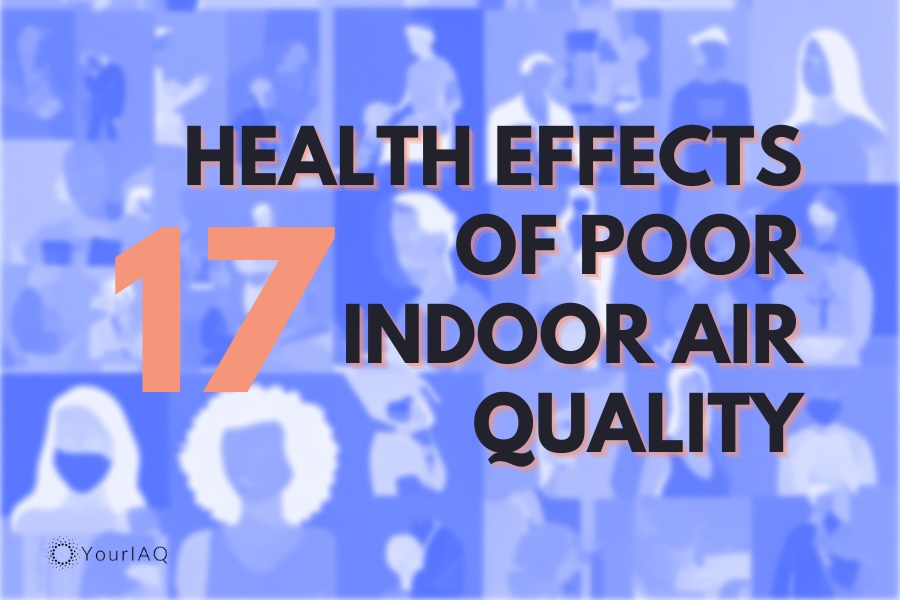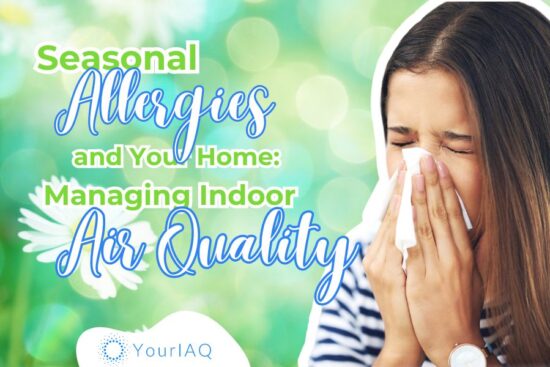
When it comes to health concerns, we often think about diet, exercise, sleep, and other behaviors. What’s sometimes overlooked is the environment where we spend our time. The air quality inside our homes and workplaces has a significant impact on our well-being. Poor indoor air quality is a silent threat that can trigger a range of health issues, from respiratory problems to cognitive impairments. In this article, we explore the various health effects of poor indoor air quality and why it’s crucial to pay attention to the air we breathe indoors.
17 Health Effects of Poor Air Quality
(Click infographic to enlarge.)

<h4>Copy the text below to share on your site</h4><textarea onclick=’this.focus();this.select()’ style=’width:540;height:150′><p>Please include attribution to YourIAQ.com with this graphic.<br /><br /><a href=’https://youriaq.com/health-effects-of-poor-air-quality/’><img src=’https://youriaq.com/wp-content/uploads/2023/10/Health-Effects-of-Poor-Indoor-Air-Quality.png’ alt=’health effects of poor air quality’ 540px /></a></p></textarea>
1. Asthma
Asthma is a common respiratory condition, and for those who suffer from it, poor IAQ can be a trigger for symptoms and exacerbate attacks [1]. Dust mites, pet dander, and mold are common indoor allergens that can worsen asthma symptoms, making it essential to maintain good IAQ, especially in homes of asthma sufferers.
2. Chronic Obstructive Pulmonary Disease (COPD)
Individuals with COPD are particularly vulnerable to the effects of poor IAQ, as it can worsen their symptoms and decrease lung function [2]. To mitigate these risks, proper ventilation and air filtration systems are crucial for those living with COPD.
3. Allergic Rhinitis
Poor IAQ can lead to sneezing, runny nose, and itchy eyes in individuals with allergies, causing discomfort and reducing their overall quality of life [3]. Identifying and eliminating allergens indoors can significantly alleviate these symptoms.
4. Eczema
Exposure to allergens in indoor air can worsen eczema symptoms, causing skin irritation and discomfort [4]. Maintaining a clean and allergen-free living environment is vital for those with eczema.
5. Sinusitis
Poor IAQ can contribute to sinus infections and inflammation [5]. Ensuring proper ventilation and minimizing the presence of airborne irritants can help reduce the risk of sinus problems.
6. Bronchitis
Irritants in indoor air can lead to acute or chronic bronchitis, making it essential to address IAQ concerns [6]. Regular air quality assessments can identify potential sources of indoor irritants.
7. Headaches
Indoor air pollutants, such as volatile organic compounds (VOCs), can trigger headaches [7]. Adequate ventilation and the use of air purifiers can help reduce exposure to these compounds.
8. Fatigue
Breathing poor IAQ may lead to fatigue and a general feeling of unwellness [8]. Improving IAQ can help boost energy levels and overall vitality.
9. Eye Irritation
Irritants in indoor air can cause dry eyes, redness, and itching [9]. Simple steps like using humidifiers and maintaining clean air can alleviate eye discomfort.
10. Nausea
Certain indoor air pollutants can induce feelings of nausea and discomfort [10]. Identifying and removing the sources of these pollutants is crucial for a healthy indoor environment.
11. Cognitive Impairment
Poor IAQ can impair cognitive function and concentration, affecting work and learning [11]. To maximize productivity and well-being, maintaining clean and healthy indoor air is essential, especially in schools.
12. Cardiovascular Issues
Long-term exposure to indoor pollutants can contribute to cardiovascular problems [12]. Implementing air quality improvement measures can reduce the risk of heart-related issues.
13. Sleep Disorders
Breathing poor IAQ may disrupt sleep patterns and lead to sleep disorders [13]. Adequate ventilation and air purification can create a conducive environment for restful sleep.
14. Immune System Suppression
Prolonged exposure to indoor pollutants can weaken the immune system, making individuals more susceptible to infections such as influenza and COVID-19 [14]. Prioritizing IAQ can help bolster immunity.
15. Childhood Development
Poor IAQ can impact children’s physical and cognitive development, potentially leading to learning disabilities [15]. Creating a clean and healthy indoor environment is crucial for children’s well-being.
16. Lung Disease
Poor indoor air quality can cause or contribute to the development of infections and chronic lung diseases [16]. Regular IAQ assessments and preventative measures such as the use of indoor air quality monitors can reduce the risk of respiratory illnesses.
17. Cancer
Long-term exposure to specific indoor pollutants, like radon and certain VOCs, may increase the risk of cancer [17]. Testing for radon and minimizing exposure to carcinogenic substances is essential for cancer prevention.
—
References
[1] – https://aafa.org/asthma/asthma-triggers-causes/air-pollution-smog-asthma/
[2] – https://www.jacionline.org/article/S0091-6749(12)01806-6/fulltext
[3] – https://www.worldallergyorganizationjournal.org/article/S1939-4551(20)30402-6/fulltext
[4] – https://www.mdpi.com/1660-4601/20/3/2526
[5] – https://www.hopkinsmedicine.org/news/articles/2018/04/air-pollutions-link–to-chronic-sinusitis
[6] – https://www.pca.state.mn.us/air-water-land-climate/air-quality-and-health
[7] – https://www.ncbi.nlm.nih.gov/pmc/articles/PMC9540829/
[8] – https://www.nature.com/articles/s41598-022-20602-z
[9] – https://pubmed.ncbi.nlm.nih.gov/10457708/
[10] – https://www.mdpi.com/1660-4601/16/22/4322
[12] – https://www.ncbi.nlm.nih.gov/pmc/articles/PMC3784920/
[13] – https://molekule.com/blogs/all/how-does-indoor-air-quality-impact-sleep
[14] – https://pubmed.ncbi.nlm.nih.gov/32007522/
[16] – https://www.lung.org/clean-air/at-home/indoor-air-pollutants






